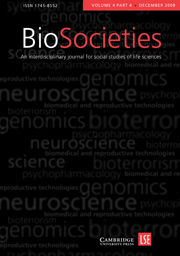Article contents
Storytelling to Enrich the Democratic Debate: The Dutch Discussion on Embryo Selection for Hereditary Breast Cancer
Published online by Cambridge University Press: 01 September 2009
Abstract
In the Netherlands, the opposition between advocates of embryo selection (preimplantation genetic diagnosis, PGD) and opponents seeking to ban PGD altogether escalated in May and June 2008, shortly after the State Secretary of Health proposed to rescind the ban on PGD for hereditary breast cancer. The clash between the Social Democratic Labour Party and the Reformed Christian Party, both represented in the Dutch Parliament, was ultimately settled in a quite friendly atmosphere. The active engagement in the debate of women and some men with a family history of hereditary breast cancer, who wrote or told their personal stories to the media, may have helped solve the conflict. In this article, I identify the stories of suffering and the arguments for or against PGD that BRCA mutation carriers made public in response to the controversy. Subsequently, the empirical findings are interpreted in light of political theories on the role of storytelling in political discourse. Deborah Stone’s recognition that storytelling is part and parcel of all political discourse and Iris Marion Young’s analysis of what stories do are used to evaluate the transformative effect that the real-life stories had in the Dutch public debate on PGD for hereditary breast cancer.
- Type
- Articles
- Information
- Copyright
- Copyright © London School of Economics and Political Science 2009
References
- 6
- Cited by


